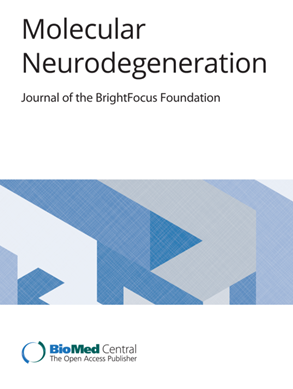几丁质酶-3-like-1:在神经炎症和退行性病理中具有治疗意义的多方面参与者
IF 17.5
1区 医学
Q1 NEUROSCIENCES
引用次数: 0
摘要
几丁质酶-3-样-1(CHI3L1)是一种进化保守的蛋白质,参与组织重塑、血管生成和神经炎症等关键生物过程。它在各种神经退行性疾病和脑部疾病中扮演着重要角色。在创伤性脑损伤(TBI)、阿尔茨海默病(AD)、帕金森病(PD)、肌萎缩性脊髓侧索硬化症(ALS)、克雅氏病(CJD)、多发性硬化症(MS)、神经脊髓炎视网膜病变(NMO)、HIV 相关性痴呆(HAD)、脑缺血中风(CIS)和脑肿瘤等神经系统疾病中都观察到了 CHI3L1 水平的升高。这篇综述探讨了 CHI3L1 在这些疾病的发病机制中的作用,重点是它对神经炎症、免疫细胞浸润和神经元变性的贡献。作为神经炎症的关键调控因子,CHI3L1 可调节小胶质细胞和星形胶质细胞的活动,促使促炎细胞因子的释放,从而加剧疾病的进展。除了在疾病病理中的作用外,CHI3L1 已成为诊断和监测脑部疾病的一种有前途的生物标志物。脑脊液(CSF)中 CHI3L1 水平的升高与疾病严重程度和认知能力下降有关,尤其是在 AD 和 MS 中,这突显了它在临床诊断中的潜力。此外,针对CHI3L1的治疗策略,如小分子抑制剂和中和抗体,已在临床前研究中显示出希望,证明可减少神经炎症、淀粉样斑块积聚和提高神经元存活率。尽管CHI3L1具有治疗潜力,但在开发选择性和安全的CHI3L1靶向疗法方面仍存在挑战,特别是在确保通过血脑屏障有效递送和减轻脱靶效应方面。本综述探讨了靶向 CHI3L1 的复杂性,强调了其在精准医疗中的潜力,并概述了未来的研究方向,旨在释放其在治疗神经退行性疾病和脑部病变方面的全部治疗潜力。本文章由计算机程序翻译,如有差异,请以英文原文为准。
Chitinase-3-like-1: a multifaceted player in neuroinflammation and degenerative pathologies with therapeutic implications
Chitinase-3-like-1 (CHI3L1) is an evolutionarily conserved protein involved in key biological processes, including tissue remodeling, angiogenesis, and neuroinflammation. It has emerged as a significant player in various neurodegenerative diseases and brain disorders. Elevated CHI3L1 levels have been observed in neurological conditions such as traumatic brain injury (TBI), Alzheimer’s disease (AD), Parkinson’s disease (PD), Amyotrophic lateral sclerosis (ALS), Creutzfeldt-Jakob disease (CJD), multiple sclerosis (MS), Neuromyelitis optica (NMO), HIV-associated dementia (HAD), Cerebral ischemic stroke (CIS), and brain tumors. This review explores the role of CHI3L1 in the pathogenesis of these disorders, with a focus on its contributions to neuroinflammation, immune cell infiltration, and neuronal degeneration. As a key regulator of neuroinflammation, CHI3L1 modulates microglia and astrocyte activity, driving the release of proinflammatory cytokines that exacerbate disease progression. In addition to its role in disease pathology, CHI3L1 has emerged as a promising biomarker for the diagnosis and monitoring of brain disorders. Elevated cerebrospinal fluid (CSF) levels of CHI3L1 have been linked to disease severity and cognitive decline, particularly in AD and MS, highlighting its potential for clinical diagnostics. Furthermore, therapeutic strategies targeting CHI3L1, such as small-molecule inhibitors and neutralizing antibodies, have shown promise in preclinical studies, demonstrating reduced neuroinflammation, amyloid plaque accumulation, and improved neuronal survival. Despite its therapeutic potential, challenges remain in developing selective and safe CHI3L1-targeted therapies, particularly in ensuring effective delivery across the blood–brain barrier and mitigating off-target effects. This review addresses the complexities of targeting CHI3L1, highlights its potential in precision medicine, and outlines future research directions aimed at unlocking its full therapeutic potential in treating neurodegenerative diseases and brain pathologies.
求助全文
通过发布文献求助,成功后即可免费获取论文全文。
去求助
来源期刊

Molecular Neurodegeneration
医学-神经科学
CiteScore
23.00
自引率
4.60%
发文量
78
审稿时长
6-12 weeks
期刊介绍:
Molecular Neurodegeneration, an open-access, peer-reviewed journal, comprehensively covers neurodegeneration research at the molecular and cellular levels.
Neurodegenerative diseases, such as Alzheimer's, Parkinson's, Huntington's, and prion diseases, fall under its purview. These disorders, often linked to advanced aging and characterized by varying degrees of dementia, pose a significant public health concern with the growing aging population. Recent strides in understanding the molecular and cellular mechanisms of these neurodegenerative disorders offer valuable insights into their pathogenesis.
 求助内容:
求助内容: 应助结果提醒方式:
应助结果提醒方式:


